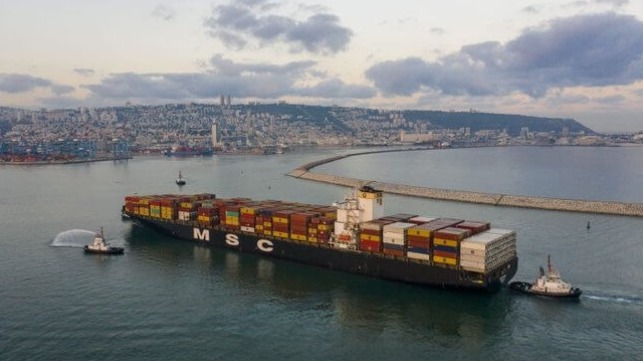MSC Expands Use of Biofuel Offering Benefits to Customers

MSC, which has been using biofuel where available for its fleet, is planning to expand its use as a transitional fuel while also launching a program for customers to meet CO2 emission reduction goals through a new carbon insetting initiative. Available at selected world ports, the MSC Biofuel Solution offers customers the opportunity to join forces with MSC to decarbonize their supply chains and achieve their climate targets.
“At MSC, we understand that we have an important role to play in decarbonization and in accelerating the energy transition of the shipping and logistics industry,” said Dimitri Ruggiero, Global Accounts Vice President. “By adopting low-carbon fuels, we’re playing an enabling role in the energy transition while also reducing the emissions of our own operations.”
As part of its program named the Journey to Net Zero, MSC has been using blended biofuels to propel its ships. MSC procures and bunkers low-carbon certified sustainable biofuel, derived from sources such as used cooking oil (Used Cooking Oil Methyl Ester or UCOME). It is responsibly sourced, second-generation biofuel that comes as a blend with conventional marine oil, and its biocomponent can reduce CO2 emissions by 90 percent. According to the company, they adopted sustainable biofuel as a transition fuel for its ocean operations because it is the only low-carbon fuel currently available that does not require any adjustment of our vessels’ engines.
“Customers can also achieve a reduction in emissions in their supply chains by taking part in our carbon insetting program, MSC Biofuel Solution,” says Ruggiero. “We are continually improving the energy efficiency of our fleet, as well as collaborating with partners across the maritime ecosystem on research, trials and pilots to promote the wider adoption of low- and zero-carbon fuels of the future.”
MSC notes that it has already made good progress in improving the energy efficiency of its fleet. They report achieving a relative decline in CO2 emissions of more than 40 percent since 2008. The company’s goal is to reach net-zero CO2 emissions by 2050.

that matters most
Get the latest maritime news delivered to your inbox daily.
The new program is MSC’s first insetting program through which it is using biofuel to reduce the carbon footprint of our customers’ supply chains as well as across its operations. Customers receive an MSC-issued Retirement Certificate stating the CO2 savings achieved, accompanied by documentation including Proof of Sustainability for the bunkered biofuel as well as an external verification statement for the carbon insetting process.
MSC becomes the first carrier in the container shipping segment to widely adopt biofuels and make the advantages available to customers to aid in the decarbonization of their supply chain. Stena Bulk introduced a similar program in 2020 giving its customers the option of participating through a carbon offsetting. The company said because biofuel was not available on all routes, it would use the fuel where possible and offer customers to contribute to the cost of the biofuel in return receiving the carbon offset certificates.
